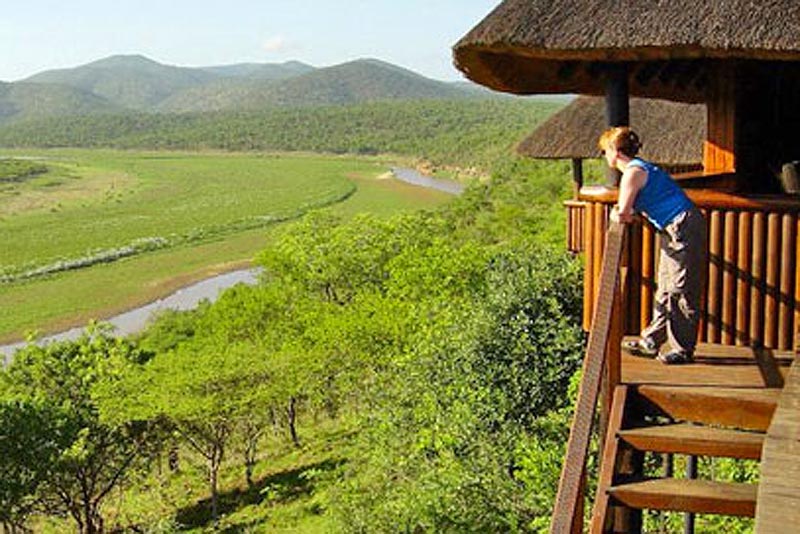Pongola Nature Reserve
Pongola Nature Reserve
The three hundred and ten square kilometer Pongola Nature Reserve is situated
along the northern and eastern banks of the Pongolapoort Dam in KwaZulu Natal.
The area was proclaimed as a nature reserve in 1894 by old president Paul
Kruger. The area has had a turbulent history, with the Anglo boer war leaving
much devastation, as well as the boers killing most of the game in the area, in
an attempt to eradicate The disease carrying Tsetse fly. In 1970 a dam was built
on the Pongal river, to provide irrigation for the areas sugarcane plantations.
An estimated area of seventeen thousand hectares were flooded in the
construction of the dam. A part of the original reserve was declared as a nature
conservation area in 1979.
The reserve consists mainly of acacia bushveld which slopes gently towards the
dam, and river. Pongola nature reserve is home to a variety of wildlife which
includes white rhino, impala, nyala, wildebees, kudu, both burchell and mountain
zebras, buffalo, elephant and a noticeably large giraffe population. The
reserve's various habitats support an estimated twenty five indigenous fish
species, about sixty species of mammals and roughly a hundred various species of
reptiles and amphibia. Rare or endangered animals inhabiting the Pongola Nature
Reserve include the honey badger and wild dog. The water is home to many hippos
and crocodile. This area is also a top notch birdwatching destination,
displaying an impressive total of over three hundred and fifty various species.
Guests are also allowed the brilliant opportunity to track Rhino on foot through
the reserve, or participate in the well known Elephant tracking programme.
The Dam itself has gained an excellent reputation as possibly the best
Tiger-fishing Destination in South Africa, attracting eager fishermen from all
over the country. The Tigerfish, also sometimes referred to as the "striped
water dog", is a freshwater fish which is indigenous to many rivers and lakes of
central Africa, as well as the northern regions of South Africa. These fish have
very strong jaws, and extremely sharp teeth, and are persistent fighters on the
end of a line. Most of the Tiger-fishing takes place between September and
October, and almost exclusively from boats due to the danger of crocodiles and
hippos along the water's edge.
Accommodation Near Pongola Nature Reserve
Oppi Koppi Lodge
Game Reserve And Bush Lodge Accommodation in Pongola
0.8km from Pongola Nature ReserveOppie Koppie is the name of the lodge with fully serviced self-catering chalets. This luxury lodge boasts five bedrooms, all ensuite with air-conditioning and excellent views from the koppie upon which it is built. …see more for bookings / enquiries and info.
Pongola Country Lodge
Hotel / Boutique Hotel Accommodation in Pongola
1km from Pongola Nature ReserveAccommodation comprises of 64 upmarket, spacious en-suite bedrooms all individually decorated in a stylish fashion of its own. All rooms are air-conditioned, equipped with a colour TV with DStv-channels and a modern telephone system. …see more for bookings / enquiries and info.
Pakamisa Private Game Reserve
Game Reserve And Bush Lodge Accommodation in Pongola
10.3km from Pongola Nature ReserveThis unique and exclusive lodge is situated in its own, malaria-free private game reserve, perched high on the slopes of Pakamisa mountain and overlooking the rolling hills of Zululand. …see more for bookings / enquiries and info.
Shayamoya Fishing & Game Lodge
Game Reserve And Bush Lodge Accommodation in Lake Jozini / Pongolapoort Dam
21.1km from Pongola Nature Reserve10 Chalets privately positioned with breathtaking views of Lake Jozini and the Lebombo Mountains. Ideally located to break the long journey from Kruger Park or Johannesburg to KwaZulu Natal resorts. You will be disappointed only with a one night stay... …see more for bookings / enquiries and info.
Amakhosi Safari Lodge
Hotel / Boutique Hotel Accommodation in Magudu
28.9km from Pongola Nature ReserveThe Amakhosi Safari Lodge is situated in the Amakhosi Private Game Reserve, on the banks of the Mkuze River, right in the heart of Zululand. It boasts six luxurious river and two honeymoon suites, in complete harmony with their surroundings. Amakhosi also …see more for bookings / enquiries and info.
 Pongola Nature Reserve - Swaziland ©
Pongola Nature Reserve - Swaziland © 





